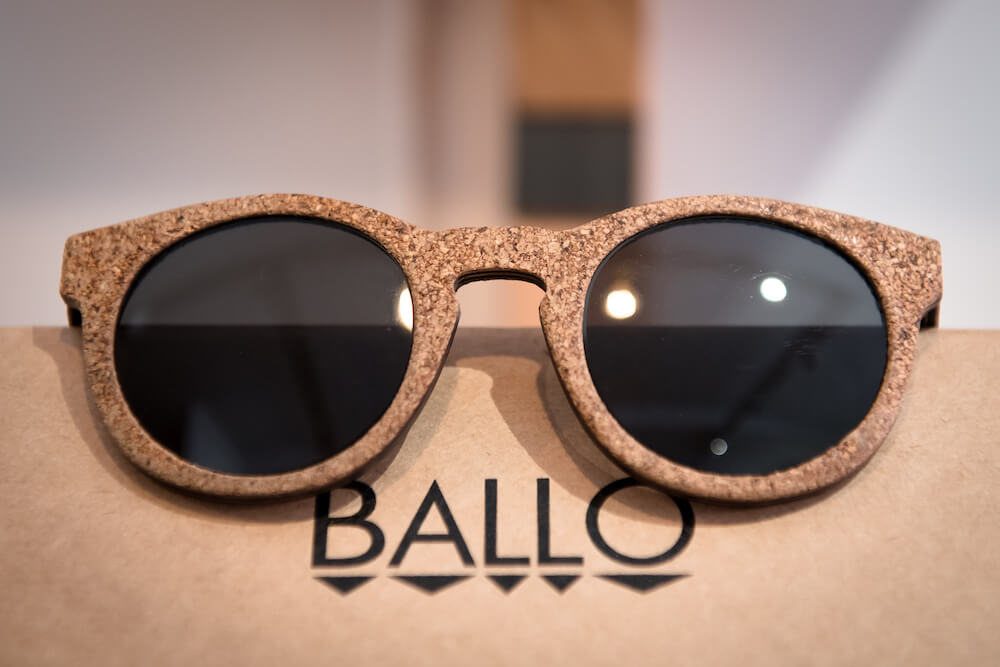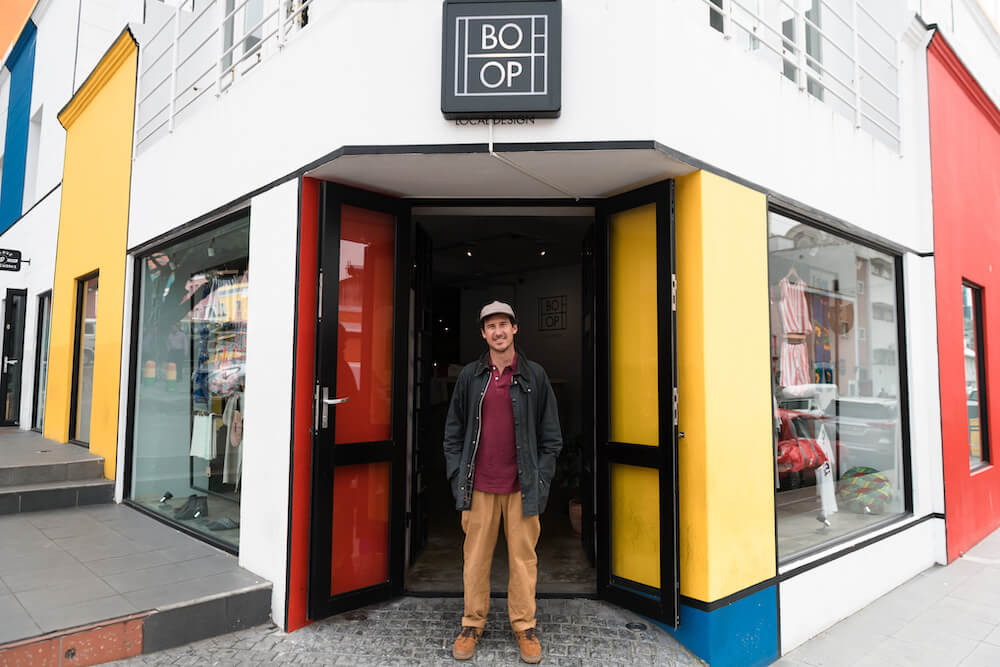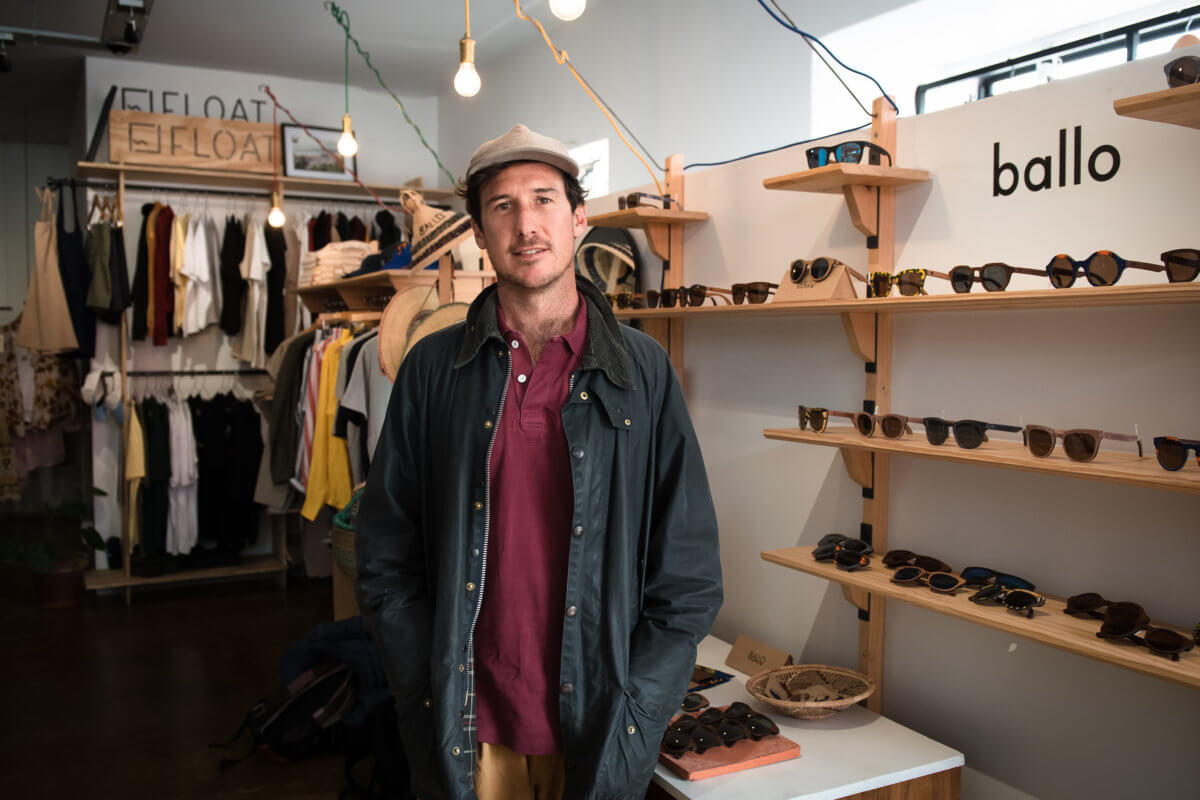Global warming is a hot topic. Things are starting to change, but corporate greed is still crippling our world one megaton of CO2 at a time. Fortunately, not every business puts profit before the planet. Ballo has seen things differently since launching in 2013. The fashion startup uses offcuts and upcycled material to make unisex eyewear and slow clothing.
We caught up with Ballo’s laid back owner Alistair Barnes to chat about the balance between bottom line and being green.

Ballo operates in a circular economy, eliminating waste and the continual use of resources. What are the specifics when talking about an eyewear company?
Our material is recycled, upcycled or intercepted before it goes to waste. Then we try to make our own waste and offcuts into other products. Keyrings, card stands, hanging pots, stuff like that. The stuff we absolutely can’t repurpose or recycle is sent to a landfill, which is the absolute last resort. To make up for that, we plant a tree for every pair of sunglasses we sell.
Ballo means ‘I dance’ in Italian. Would it be fair to say that the business is in rhythm and harmony with the planet, doing a dance of sustainability?
Ya that’s nice. We try to flow with the universe, if you can put it that way. You’re learning things all the time as new info becomes available that we can incorporate into the business. It’s never perfect but we’re always trying to be better.
How did Ballo start?
Years ago, I was freelancing as a designer. A mate sent me an article about these cool wooden sunglasses. An American brand with a strong sustainability angle. They looked amazing so I reached out and started importing them.
Then I saw these dudes on Shark Tank. They were explaining how these “local and sustainable” glasses were imported from China super cheaply before being shipped all over the world. I couldn’t do that anymore so I looked into doing it locally and authentically. I found an engineer with proper experience, sourced some wood and we started making the sunglasses I thought I was buying in the first place.
When did you decide that the environment was important enough to base an entire business around?
My dad’s from the US, so when I was young we’d go to Washington. It gets cold there and my dad got us these cool fleece jerseys. He said they were made from recycled plastic bottles, it blew my mind. I was only a kid but I remember thinking, how cool is that?! The seed was definitely planted back then. I later learned that the brand was Patagonia. That was all the proof I needed that this stuff was possible.
What practical things can people do daily to be kinder to the planet?
You have real power in terms of what you buy. Buy local, vintage and second hand where you can. Basically the shorter the distance it takes something to get from where they made it to you, the better. I try to live that as much as possible.
You put the planet before profit, which is really cool. But a business has to be profitable in order to employ people. How do you manage Ballo’s sustainability versus its bottom line?
That’s the challenge. It’s been difficult for the last couple of years. Especially hyper-locally. The drought in Cape Town affected our biggest market: tourists. Business-wise that was a major stress because when we started, we were growing 300/400% year-on-year. Then we hit a wall and started running at a loss. Right now we just want to stay afloat, keep our employees employed, keep the lights on and become profitable again.
We’ve looked at exporting, but I don’t want to ship Ballo all over the world and contribute to things I don’t stand for. But do I have more responsibility to the planet or my employees? Capitalism is obsessed with infinite growth, but how can there be infinite growth in a world with finite resources? It can’t. It’ll break and it’s breaking right now. We just do the best we can and try to have a bit of fun along the way.
How do you go about designing a pair of stylish unisex shades?
A lot of it’s just checking out what people are wearing and seeing how we can put our own spin on it. Nature is a big source of inspiration for us as well. We’ve got a pair called the Olive, which is literally inspired by the shape of an olive. We had one called the E-Type, after the classic Jaguar. I pulled up to my workshop and saw the car parked across the road. Long bonnet, clean lines, those headlights. It looked so good. You have to operate within certain constraints when you’re working with faces, but you can get inspiration from anywhere.
We also prototype really fast. I can design something on the computer and have a prototype within an hour. Experimenting leads to uncharted territory.
When discussing making glasses by hand versus by machine, what kind of process are we talking about?
Most companies are using high tech, automated laser cutters. Ours are cast iron German machines from the 60s. Making it by hand gives someone skills and a job, and it means there’s no two Ballo sunglasses exactly alike. When I’m showing someone the sunglasses, they’ll find their style and I’ll pull out a few different options of that style. When each pair has slight variations, there’s always one that fits perfectly.
You work with local designers. How do you figure out who to work with, and what do they bring to the process?
We get most of our fabric offcuts from a place in Obz called Black Chillie Style. They sell amazing suits and dresses made from African printed fabrics. We’ve got a great relationship; they send the offcuts over and we give them a pair of sunglasses. So it’s not local designers in the typical sense, but there’s definitely collaboration with local businesses and creatives.
What motivated the expansion into making clothes? And, more specifically, slow clothing?
Ballo was a big supporter of the Eco Film Fest that used to happen in Cape Town. There were documentaries from all over the world and I learnt a lot about fast fashion. A R50 t-shirt is cheap for you but it costs the planet so much. We wanted to give people another option. We made most of our garments from hemp at first. Then we found a locally grown and spun cotton supplier, which is a big win.
We’d like to use more hemp, but it’s really expensive. It used to be the most prolific fabric in the world, but a big part of the USA’s war on drugs was to push cotton and its profitability. So they made the entire marijuana plant illegal, even though hemp has nothing to do with cannabis.
Literally, the Afrikaans and Dutch word ‘hemp’ comes from the plant, the word ‘canvas’ is derived from cannabis. But the entire western world followed America. So we lost a lot of ground and we’re nowhere near where we should be in terms of how we use hemp in everyday life

What have the biggest challenges been in starting, running and growing Ballo? Any particularly difficult hurdles?
I don’t really want to grow. Not in a normal sense anyway. I want Ballo to improve its employees’ quality of life and spread a message that might help save the world. Ballo isn’t Patagonia, but if we’re showing that a company can be run this way. We’re not exactly shooting the lights out, but we’ve been able to paper over the cracks when it gets tough and we’re learning. It’s exciting, it’s challenging, it’s entrepreneurship.
And the biggest reward?
I still get excited when I see someone wearing my product. The first time I saw someone wearing my product, I went “Ballo Ballo Ballo” and they looked at me, smiled weirdly and then went on with their day. It was such a kick. Really satisfying.
What advice would you have for prospective entrepreneurs that also want to build sustainable businesses?
Just give it a try. Just go. Just start. Your first step is never perfect, neither will your second or third, but you’ll learn from that. You’ll make progress and you’ll get somewhere worth going. Also, let people do what they’re good at. If you’re not a numbers person, hire someone or partner with someone that is. You have to learn a bit about everything when you run a business, but specialists can make a big difference.



